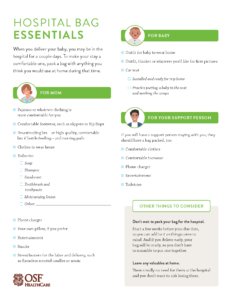If you’re an expectant mom, preparing for the big day can be a little overwhelming, especially if you’ve never given birth before. Nursery colors, cribs, car seats – there’s so much to do, it can be easy to put off preparing for your hospital stay.
You might spend multiple nights in the hospital after labor and delivery, so you’ll want to have a hospital bag – a backpack, duffel bag, piece of luggage or whatever you prefer – packed with things to make your stay more comfortable.
Patricia Gelezauskas, a nursing supervisor for acute obstetrics at OSF HealthCare, offered this tip about when to pack your hospital bag.
“A hospital bag should be prepared ahead of time, not when you’re getting ready to leave for the hospital,” Patricia said. “Think about the things you want to have with you. You can ask friends or relatives who have been through labor and delivery what they brought. Your pajamas, your slippers or flip flops, showering necessities, anything you think you would use at home, bring with you.”
It’s wise to have your bag packed at least a few weeks before your scheduled due date, so everything is ready if you go into labor before that date.
Below is more guidance to help you decide what to pack in your hospital bag. You can also print out our handy checklist for mom and baby to help make sure you have the right hospital bag essentials for this big occasion.

Get organized before delivery day
Download our checklist
What to pack in your hospital bag
Hospital bag for mom
Every birthing facility is different when it comes to what it supplies for patients during their stay, so take a tour of the place and ask the staff questions beforehand, if possible. Moms are going to want to have essentially whatever they would want or need for recuperating at home.
- Bathrobe
- List of current medications
- Personal items such as eyeglasses, contact lenses, case and solution, phone, camera, laptop and chargers
- Breastfeeding bra or quality bra if bottle feeding and nursing pads – whether or not you plan to nurse, you’ll appreciate the support and leak protection
- Comfortable clothes in six-month maternity size
- Comfortable shoes, slippers or sandals
- Insurance information and driver’s license
- Two or three pairs of warm, non-skid socks for walking before and after labor
- Toiletries/hygiene products – hairbrush, toothbrush, toothpaste, deodorant, face wash, makeup, shampoo, conditioner, lotion and lip balm
- Headband or ponytail holder (avoid clips as they may not be comfortable)
- Your own pillow, if you prefer it for comfort
- Nursing pillow, if you’re going to breastfeed
Hospital bag for baby
Most hospitals provide pajamas and blankets for newborns, bottles and formula if you request them and pretty much anything else baby could need during the hospital stay.
- Car seat carrier: Remember to familiarize yourself with your car seat before coming to the hospital.
- Outfit for pictures or for going home
- Baby book for footprints and other keepsakes
- Blankets and outdoor gear for the ride home, as seasonally appropriate
Hospital bag for dad or other support person
If you’re support person is going to be with you for your stay, they will also need some basic essentials for their comfort.
- Comfortable clothes and footwear
- Personal hygiene supplies
- Cash for meals and snacks
Leave it at home
Some things won’t be needed while you’re in the hospital and are better off left at home for safe keeping.
- Medications, unless instructed by your health care provider to bring them
- Valuables and large amounts of money – most facilities cannot be responsible for personal property
- Stopwatch (your nurse or a monitor will take care of timing contractions)
Last Updated: September 21, 2023
